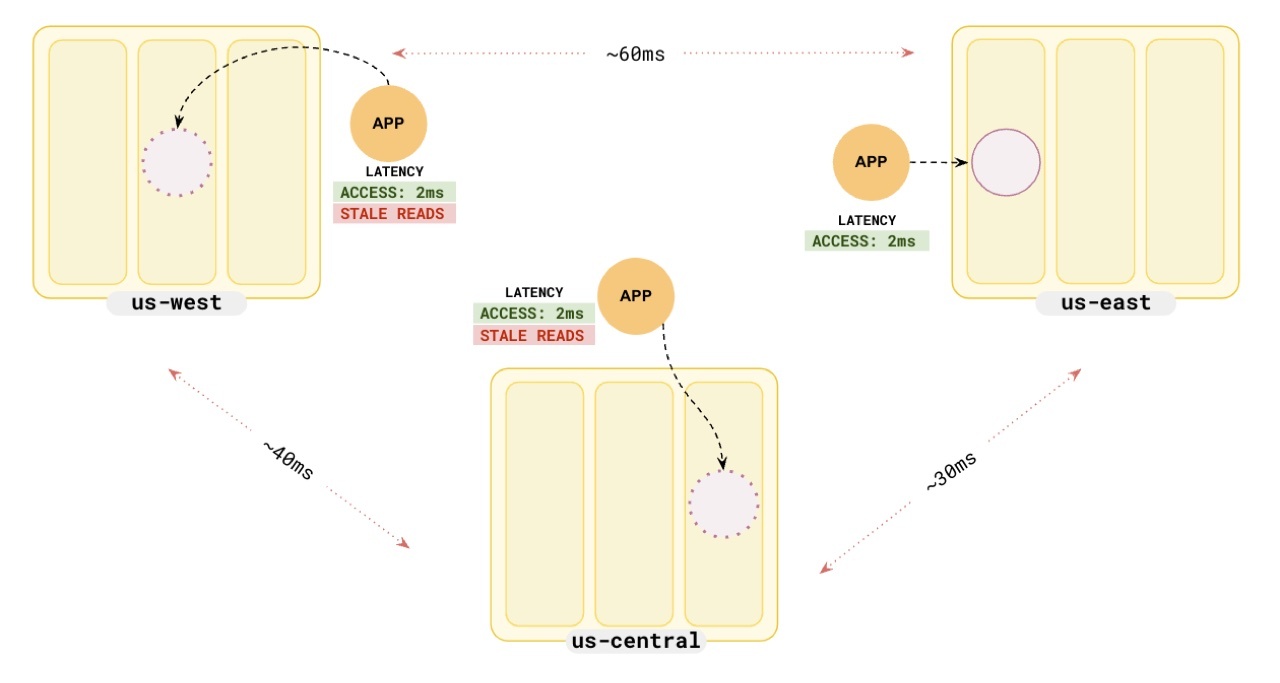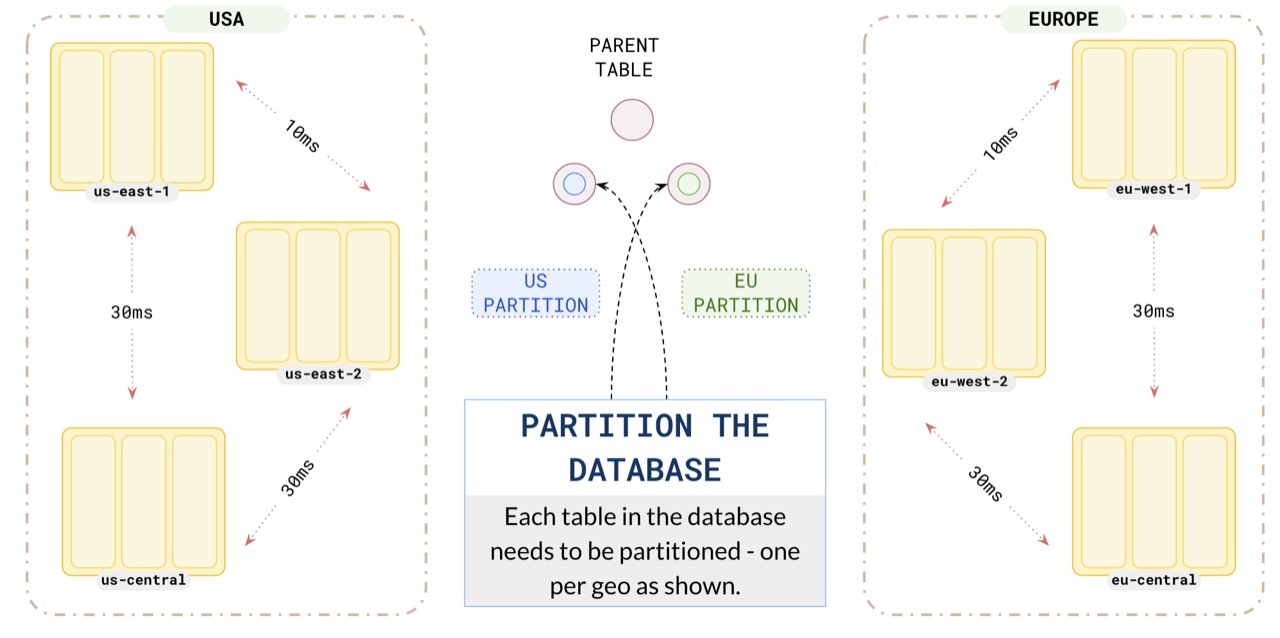Redefining Healthcare Collaboration With Advanced Geo-Distribution
Welcome to the future of healthcare! Meet the pioneering healthtech software company (who must, unfortunately, remain anonymous) dedicated to creating a disease protection system. How, you may ask? By building an application that empowers insurers to offer holistic help against specific illnesses. Their goal—is to revolutionize healthcare by bringing together technology experts, insurance providers, and healthcare specialists.
For patients, the application provides a personalized illness score from a comprehensive assessment. This data-driven method provides a deeper understanding of a person’s illness risk along with actionable insights.
For doctors, the new platform provides access to cutting-edge technology for data validation. It also facilitates global collaboration around the most up-to-date treatment guidelines and knowledge. Combined, this allows healthcare professionals to deliver the highest standard of care to every patient, ensuring the best possible outcomes in their treatment journey.
With this application, the healthtech company can offer its users: will enable the Healthtech company to offer its users:
- Treatment Collaboration. Global collaboration to analyze and treat patients
- Mobile Accessibility, so patients access their results and manage their health online
- Operational Efficiency. Real-time status updates and process checks of platform members
Technical Requirements for the New Application
The healthtech company’s geo-distributed application has to operate seamlessly across countries and regions while safeguarding sensitive data for doctors and healthcare workers. The application must also be deployed in the public cloud to minimize operational costs.
The following parameters and requirements guided their decision:
- Deployment: Multi-region. The architecture currently spans eight global regions, with plans to expand further. Each region has three nodes.
- Primary Database Requirement: Row-level geo-partitioning and data pinning for compliance. The company wanted to deploy a single table across regions to ensure that patient data remained localized to their respective countries, while allowing doctors to query data across the entire patient dataset seamlessly. They did not want to manage individual PostgreSQL instances in each region.
- Cloud Used: Google Cloud
- Cloud Instance Types: n1-standard-4
- Workload Characterization: Read-heavy
- Throughput: 125 YSQL ops/s and 450 total TServer ops/s
- Additional Database Requirements:
- Support multiple database instances across regions while meeting regulatory requirements
- Distribute data automatically without manual consolidation across regions
- Simplify user access with one unified database (no separate per-region logins).
- Provide low latency reads and writes to optimize end user experience
- Scale on-demand as demand grows and simplify expansion into new regions
Building a Geo-Distributed Application on YugabyteDB Aeon (Formerly YugabyteDB Managed)
Based on the above requirements, the healthtech company deployed their geo-distributed application on YugabyteDB Aeon, our fully-managed database-as-a-Service offering.
As mentioned above, the deployment spans eight global regions, with three nodes in each region. The application relies on a single, distributed database that spans three continents: North America, Europe, and Asia.
By having three nodes per region, they are able to deploy a replication factor of three. Data is synchronously replicated across the three zones in a region. A node or zone failure results in no data loss and minimal to no impact on application performance since the architecture ensures operations occur in the same region for low read and write latency.
Now let’s explore the four key elements of the final architecture.
Row-Level Geo-Partitioning
Their selected architecture includes partitioned tables that are localized within specific regions to:
- Minimize read and write latency, providing a seamless user experience.
- Ensure compliance with regional standards.
The application uses the row-level geo-partitioning capability of YugabyteDB Aeon, where the rows are partitioned on the “Region” column. The healthtech company created a single, geo-partitioned table instead of creating a standalone database in each region which allowed them further to streamline data management and lower operational costs.
By using a single, global database, they can run queries across the entire dataset and implement schema changes with ease. As a result, they can deliver a unified portal to doctors who are spread across regions while maintaining robust data residency safeguards through a single, globally distributed database.
This approach to “data residency” helped bolster patient and doctor trust by securely handling sensitive data and meeting compliance requirements.
Follower Reads and YB-TServer Caching
The healthtech company harnessed the power of follower reads and YB-TServer caching to enhance performance. Using follower reads in regions featuring replicas reduced the read latencies for global tables. This helped them deliver a responsive experience for users across the globe.

Architecture for follower reads for non-partitioned tables. Localized Partitioned Tables
Along with non-partitioned tables, the healthtech company also leveraged localized partitioned tables for part of their application. Partitioning a table splits it up into smaller, more manageable tables to help with performance and compliance (when pinned to a specific location). The partitioned tables do not appear or act differently from the original table, so the application is usually unaware that it has been partitioned.

Architecture: Locality-optimized geo-partitioning for localized partitioned tables High Availability
The healthtech company ensured high availability (HA) and system redundancy by deploying a replication factor of three (RF3), which can withstand any availability zone or node-level failures.
A global tablespace was set with a replication factor of five (RF5) to ensure each region had a shard replica for global tables. This setup provided the necessary performance and scalability required for future growth.
In Summary…
In the fast-paced world of health tech, this example showcased the transformative power of technology by choosing the right database solution. With YugabyteDB Aeon as their partner, the healthtech company is forging a brighter future, providing hope and resilience where it is most needed.
Learn more about YugabyteDB Aeon and the features highlighted in this case study through the following resources:
- Attend a Thursday demo to see geo-partitioning in action.
- Sign up for a full-featured, free trial of YugabyteDB Aeon to give geo-partitioning a try.
- Visit our Docs and Blog to discover how you can build a global application with YugabyteDB.




